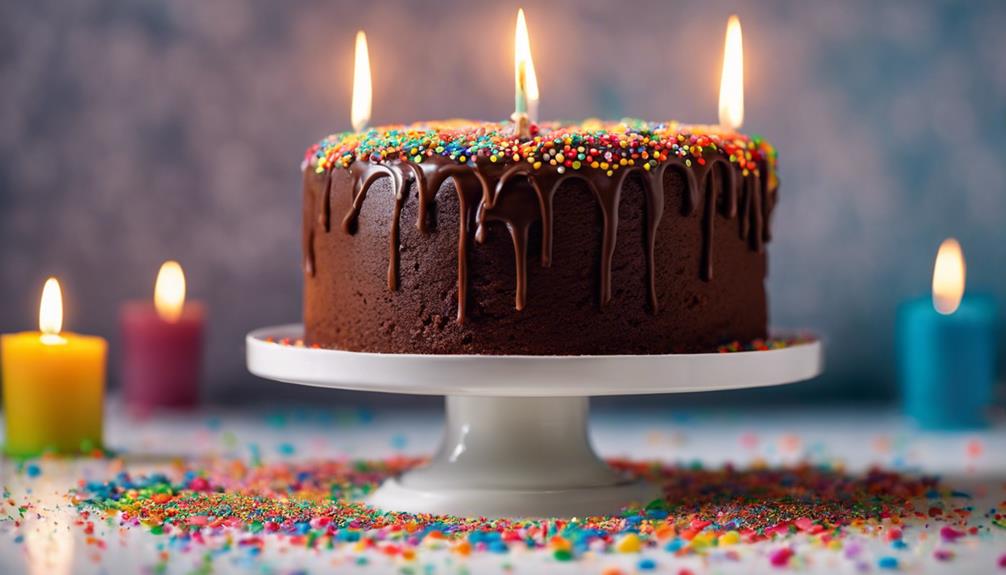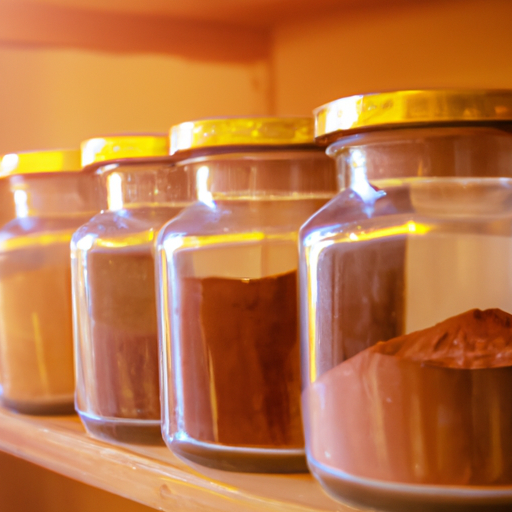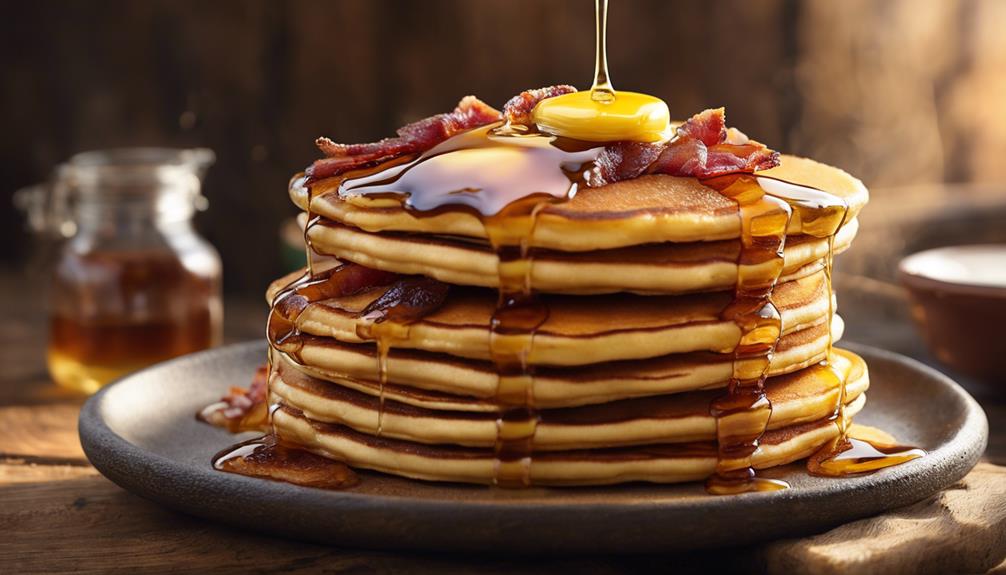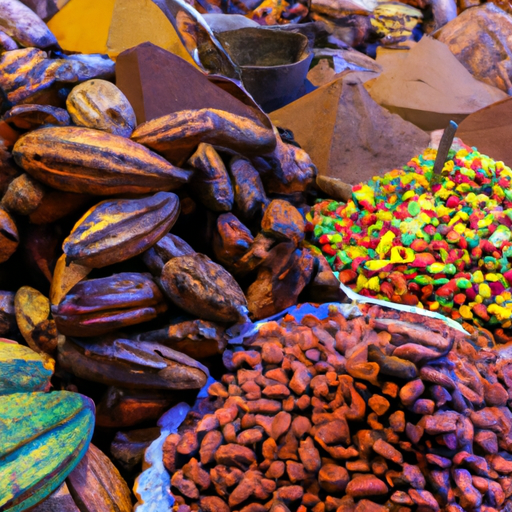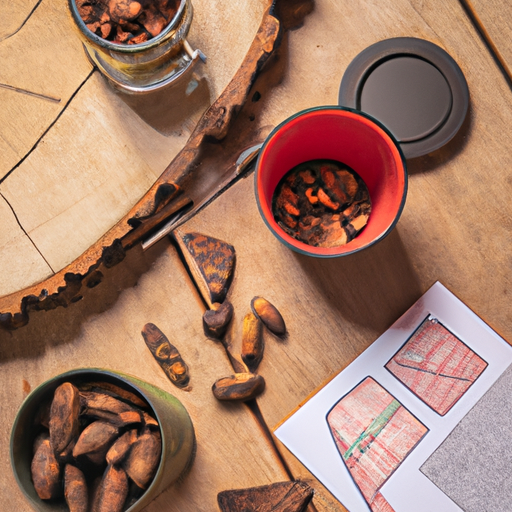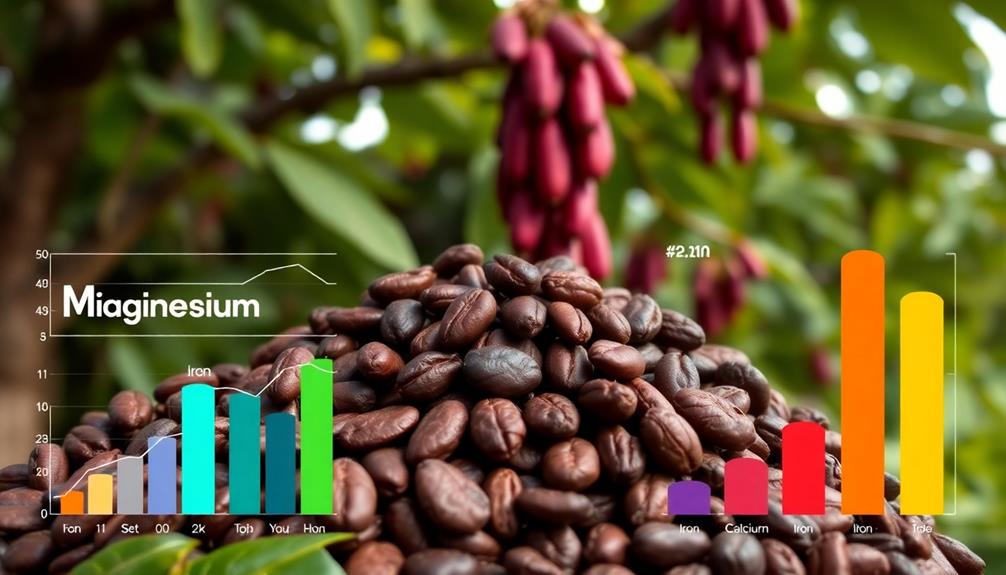When considering the caffeine content in cocoa, one should be aware that unsweetened cocoa powder typically contains around 12 mg of caffeine per serving. This can provide a natural energy boost. Opting for decaffeinated cocoa options can significantly lower the caffeine levels, making it a healthier choice for individuals monitoring their caffeine intake. If you are interested in learning more about how cocoa can be incorporated into your daily routine, exploring the different types and their caffeine levels may reveal some interesting benefits.
Key Takeaways
- Unsweetened cocoa powder contains around 12 mg of caffeine.
- Decaffeinated cocoa powder greatly reduces caffeine content.
- Dutching cocoa powder can lower caffeine levels by about two-thirds.
- Decaf cocoa options like Supercocoa reduce caffeine levels by 80.1%.
- Switching to decaf cocoa helps manage caffeine intake while enjoying cocoa's benefits.
Caffeine Content in Cocoa Powder
When I scoop a tablespoon of unsweetened cocoa powder into my morning smoothie, I'm adding around 12 mg of caffeine to my drink. Cocoa, that beloved ingredient in chocolates, carries a surprising amount of caffeine. This natural stimulant gives cocoa its energizing kick, making it a flavorful addition to your recipes.
However, if you prefer to limit your caffeine intake, there are options available. Decaffeinated cocoa powder can greatly reduce the caffeine content while still offering the health benefits and rich taste of chocolate. The process of Dutching cocoa powder can also lower caffeine levels by about two-thirds, providing a milder option for those sensitive to caffeine.
Decaffeinated Cocoa Options
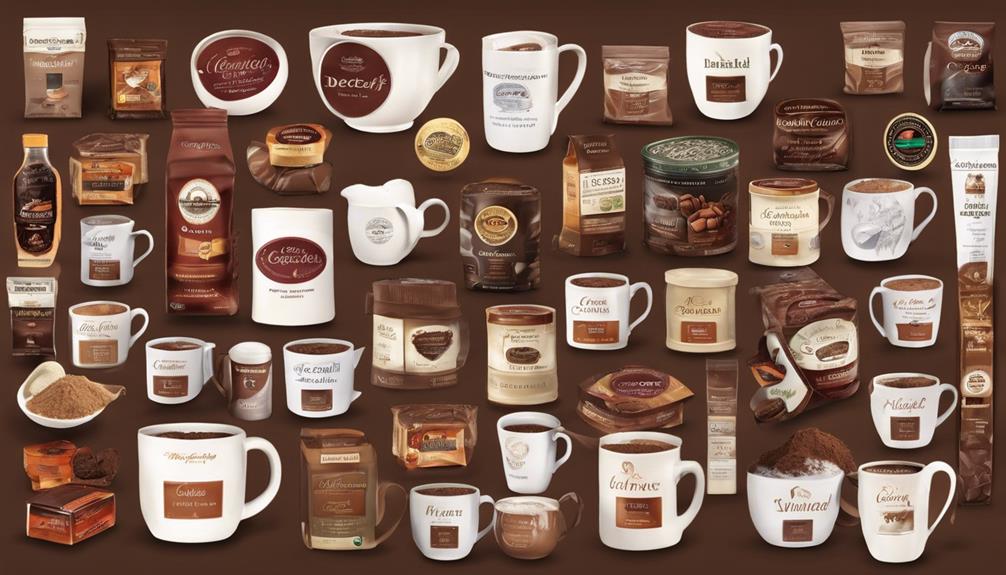
When looking for decaffeinated cocoa options, consider brands like Supercocoa that offer powders with greatly reduced caffeine levels. These decaf varieties retain essential compounds like theobromine and polyphenols, ensuring health benefits without the stimulating effects of caffeine.
Opting for decaffeinated cocoa can be a suitable choice for those sensitive to caffeine or looking to enjoy cocoa's nutritional advantages without the jolt.
Decaf Cocoa Varieties
Decaffeinated cocoa varieties, such as those offered by brands like Supercocoa, provide a solution for individuals seeking lower caffeine content while still enjoying the health benefits of cocoa. Opting for decaf cocoa can be beneficial for those with caffeine sensitivity. The decaffeination process reduces caffeine levels by about 80.1%, making it a great alternative for those looking to limit their caffeine intake.
Despite the reduction in caffeine, decaffeinated cocoa powder still maintains essential compounds like theobromine and polyphenols, which contribute to its health benefits. Brands like Supercocoa guarantee that even in decaf cocoa varieties, these beneficial compounds are preserved, allowing consumers to enjoy the rich flavor and potential health advantages of cocoa without the stimulating effects of caffeine.
Caffeine-Free Options
Considering the increasing demand for alternatives with lower caffeine content, exploring caffeine-free options like decaffeinated cocoa varieties becomes a notable choice for individuals seeking to enjoy the benefits of cocoa without the stimulating effects of caffeine.
Decaffeinated cocoa options can reduce caffeine levels by 80.1%, making them suitable for those with caffeine sensitivity. The decaffeination process maintains the beneficial theobromine and polyphenols found in cocoa. Brands like Supercocoa offer decaffeinated cocoa products that retain health benefits while lowering caffeine content.
Decaffeinated cocoa powder is a feasible choice to enjoy cocoa's flavor and health benefits without the stimulating effects of caffeine. Switching to decaffeinated cocoa can help manage caffeine intake while still enjoying the taste and nutritional advantages of cocoa.
Hot Chocolate and Caffeine Levels
When it comes to hot chocolate and caffeine levels, different brands and preparation methods can affect how much caffeine is in your cup.
For example, Starbucks hot chocolate contains more caffeine than Swiss Miss basic mix.
It's important to be mindful of the caffeine content, especially for children or those sensitive to caffeine.
Caffeine Content Comparison
In comparing caffeine content levels between hot chocolate and coffee, the former typically contains less caffeine due to its cocoa powder base. When it comes to caffeine comparison, hot chocolate usually falls on the lower end of the scale. Here's a breakdown to give you an idea:
- Starbucks hot chocolate contains around 25 mg of caffeine.
- Swiss Miss basic mix has approximately 5 mg of caffeine per serving.
- The caffeine amount in hot chocolate varies between different brands and recipes.
- The caffeine content in hot chocolate depends on the method of preparation.
Effects on Children
How do hot chocolate's caffeine levels affect children's sensitivity to its effects? Hot cocoa, a favorite among kids, usually contains lower caffeine content, making it a vital choice. Children are more prone to feeling caffeine's effects, such as restlessness or trouble sleeping, so it's important to monitor their intake. Opting for decaffeinated hot chocolate can help minimize these effects. Understanding the typical caffeine levels in a serving for children, around 5-10 mg depending on the brand and preparation, can guide parents in making informed choices. Here's a visual representation of caffeine levels in some common beverages:
| Beverage | Caffeine Content (mg) |
|---|---|
| Hot Chocolate | 5-10 |
| Soda | 30-40 |
| Energy Drink | 80-100 |
Comparison: Cocoa Vs. Coffee Caffeine
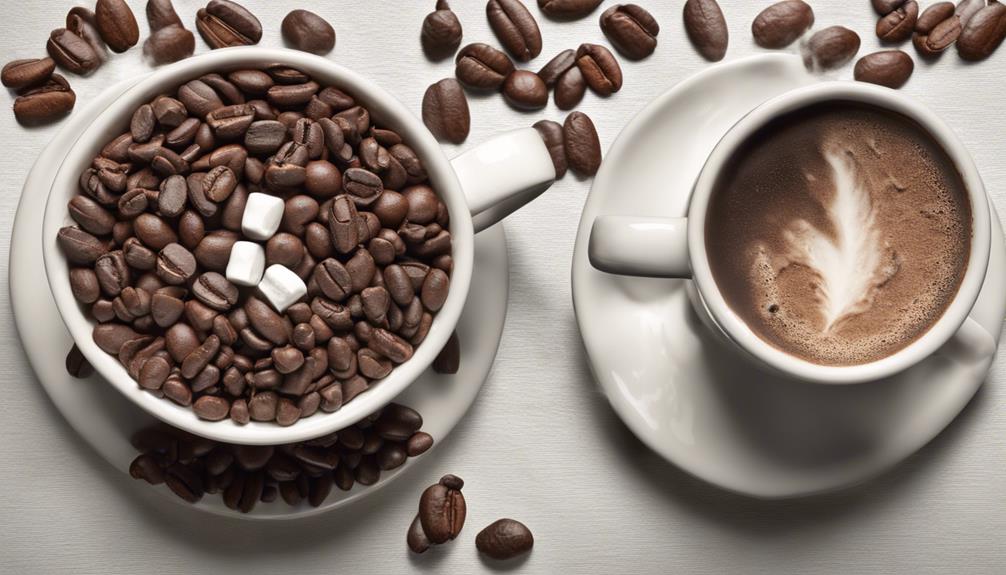
I find that comparing the caffeine content in cocoa and coffee reveals interesting differences in their stimulant levels. When looking at the caffeine content, cocoa powder packs a punch with 230 mg in 3.5 oz, while an 8 oz cup of regular coffee contains 95-165 mg. Here are some key points
- Cocoa powder: Rich in caffeine content, providing a significant energy boost.
- Coffee: Contains varying levels of caffeine, offering a stimulating effect.
- Flavanols: Abundant in cocoa powder, contributing to improved circulation and health benefits.
- Caffeine amount: Higher in cocoa powder compared to regular coffee, providing a stronger kick.
It's essential to understand these distinctions
based on your needs and preferences. Whether you seek a quick energy boost or long-term health benefits, knowing the differences between cocoa and coffee can guide your decision-making process.
Opting for Cocoa Over Coffee

When comparing the health benefits of cocoa and coffee, opting for cocoa over coffee can provide a richer source of flavanols and potential long-term advantages. Cocoa powder contains a significant amount of flavanols, which contribute to improved blood circulation and help prevent cell damage. Although coffee consumption can aid in preventing chronic diseases like liver disease and Type 2 diabetes, the flavanols in cocoa offer unique health benefits that make it a favorable choice for overall wellness.
To highlight the differences between cocoa and coffee further, let's take a look at the table below:
| Aspect | Cocoa Powder | Coffee |
|---|---|---|
| Caffeine | Low | High |
| Flavanols | Rich source | Limited content |
| Health Benefits | Improved circulation, | Energy boost, |
| cell damage prevention | disease prevention |
Chocolate-Covered Espresso Beans
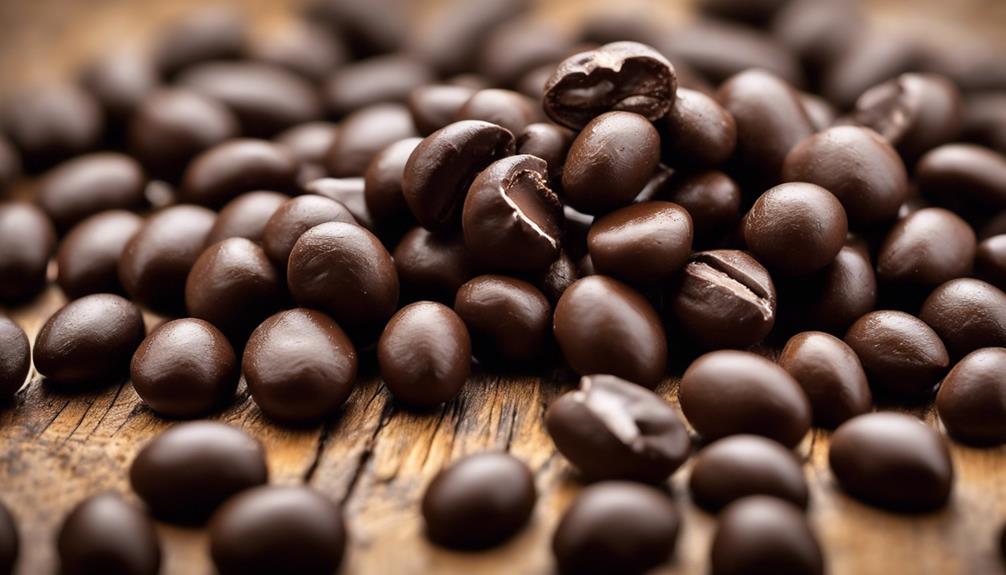
Chocolate-covered espresso beans are a popular choice for a quick energy boost due to their caffeine content and convenient bite-sized form. When you bite into one of these beans, you get a burst of caffeine that can help keep you alert and focused throughout the day. Here are some key points to keep in mind about chocolate-covered espresso beans:
- The caffeine content in each bean typically ranges from 6-7 mg, making them a potent source of energy.
- The size and type of bean used can affect the overall caffeine content, so pay attention to these factors.
- Dark chocolate, commonly used to coat these beans, adds to the caffeine kick you get from indulging in this treat.
- Munching on a handful of these beans can offer a caffeine boost similar to that of a small cup of coffee.
Next time you need a pick-me-up, keep in mind reaching for some chocolate-covered espresso beans for a tasty and energizing snack.
Caffeine Comparison: Cocoa, Coffee, Tea

With higher caffeine content than coffee or tea, cocoa powder offers a potent alternative for an energy boost. To better understand how cocoa compares in caffeine content to brewed coffee, black tea, and decaffeinated coffee, let's take a closer look at the numbers:
| Beverage | Caffeine Content (per 100g) |
|---|---|
| Cocoa Powder | 230 mg |
| Brewed Coffee | 95-165 mg |
| Black Tea | 40 mg |
| Decaffeinated Coffee | 1-5 mg |
As we can see from the table, cocoa powder contains significantly more caffeine than both black tea and decaffeinated coffee, making it a robust choice for those seeking an energy boost. While brewed coffee still remains a popular choice for many, cocoa provides a unique alternative with added health benefits such as flavanols, which can help improve circulation. So, next time you need a pick-me-up, consider reaching for a cup of cocoa for a flavorful and energizing experience!
Exploring Cacao Vs. Cocoa
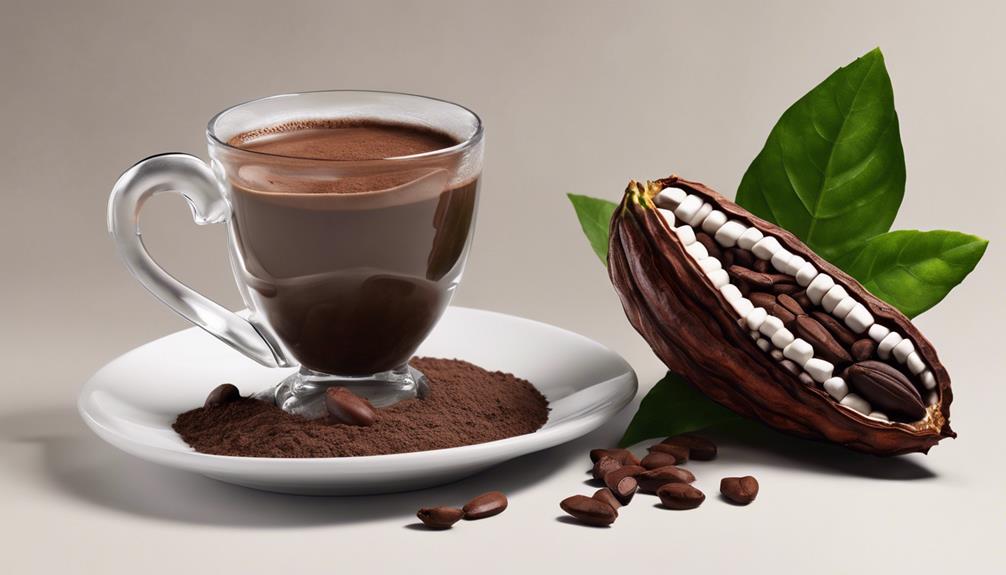
Cacao powder, derived from unroasted cacao beans, differs from cocoa powder, which is crafted from roasted cacao beans. When comparing the two, cacao is more nutrient-dense due to its minimal processing, while cocoa offers a richer flavor profile from the roasting process. Here are some key differences to help you understand them better:
- Cacao Powder
- Cold-pressed from unroasted cacao beans
- Higher in antioxidants and retains more of its natural health benefits
- Contains more prebiotic fiber for gut health
- Typically has a more bitter taste due to minimal processing
Both cacao and cocoa powders contain caffeine since they originate from the cacao bean. While cocoa powder is known for its rich minerals and polyphenols that provide potential health benefits, cacao powder stands out as a good source of prebiotic fiber, promoting the growth of beneficial gut bacteria.
Buying Cocoa Powder: Caffeine Consideration
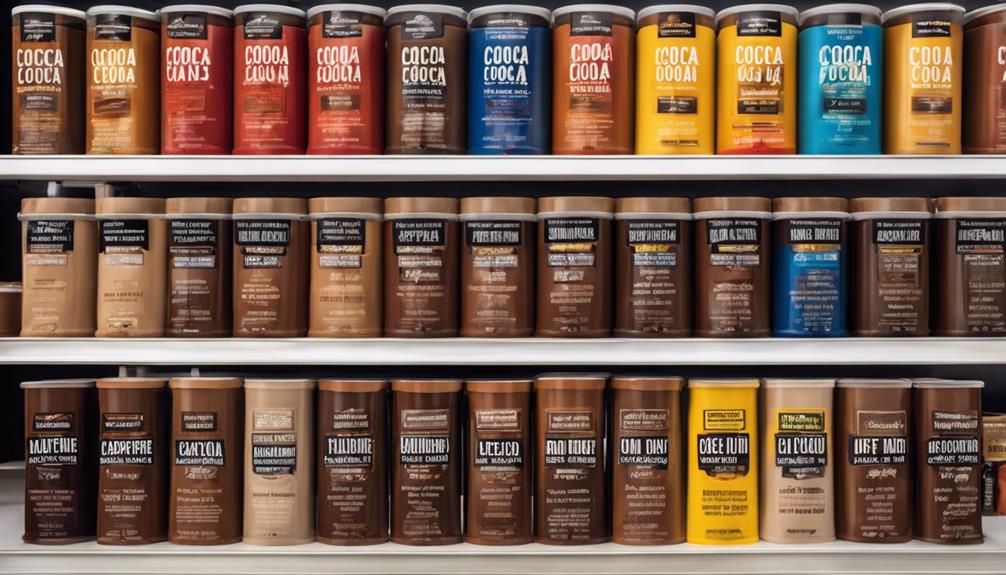
Shifting from discussing the distinctions between cacao and cocoa, the focus now shifts to contemplating the caffeine content when purchasing cocoa powder.
When buying cocoa powder, it's crucial to take into account the caffeine levels. Unsweetened cocoa powder contains approximately 230 mg of caffeine per 100g. For those seeking to reduce their caffeine intake, decaffeinated cocoa powder is an option.
The decaffeination process can decrease caffeine levels by about 80.1%, while still preserving essential functional components like polyphenols and theobromine. This means you can enjoy the benefits of these compounds without the stimulating effects of caffeine.
It's important to note that caffeine sensitivity varies among individuals, so it's wise to be mindful of your body's response when consuming cocoa powder. By opting for decaffeinated cocoa powder, you can still relish the flavor and health benefits of cocoa while effectively managing your caffeine intake.
Frequently Asked Questions
Does Cocoa Have More Caffeine Than Coffee?
Cocoa contains more caffeine than coffee. The caffeine in cocoa powder surpasses that of most coffee beverages ounce for ounce. It's surprising how this sweet treat packs a caffeine punch higher than a cup of joe.
Does Hot Cocoa Have a Lot of Caffeine?
Feeling cozy with my hot cocoa, I can share that it typically doesn't have a lot of caffeine. The amount varies based on factors like brand and preparation. But for a gentle boost, it's a delightful choice.
How Much Caffeine Is in Hershey's Cocoa Powder?
Hershey's Cocoa Powder contains about 12 mg of caffeine per tablespoon. It can vary based on the amount used. It's not as high in caffeine as some cocoa products, but still provides a mild stimulant effect.
Is Cocoa a Stimulant Like Caffeine?
Feeling like a cozy hug, cocoa is more than just a stimulant like caffeine. It offers the warmth of comfort without the jitters. Sip slowly, savoring the moment as cocoa gently soothes.
Can Cocoa Have Different Levels of Caffeine?
Yes, the amount of caffeine in cocoa can vary. While cocoa beans naturally contain caffeine, the processing method and type of cocoa product can impact the final caffeine level. Generally, dark chocolate and cocoa powder have higher caffeine content compared to milk chocolate or cocoa butter.
Conclusion
To sum up, cocoa may not have as much caffeine as coffee, but it still contains a moderate amount that can provide a little boost of energy.
If you're looking to reduce your caffeine intake, decaffeinated cocoa options are available. Remember to check the labels when buying cocoa powder to be aware of the caffeine content.
So, whether you choose cocoa or coffee, enjoy your warm beverage and savor the moment!


